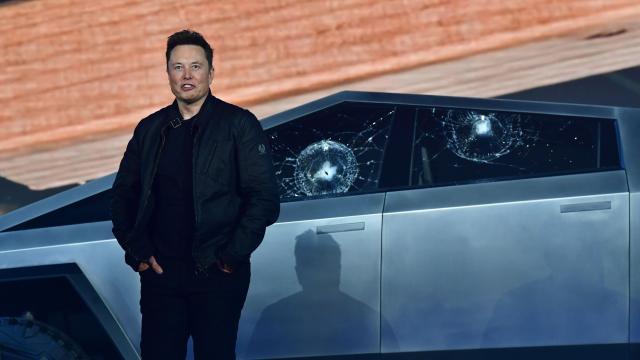Ah, another day, another overly optimistic tech deadline. Tesla CEO Elon Musk, a certified veteran in this arena, has promised the public fully-autonomous Teslas are just around the corner dating back to 2014 but has so far had to eat his lunch. Rather than ease up on those lofty expectations, the troll king of Twitter decided to double down with a new prediction: Tesla will launch commercial robotaxis by 2024!
Musk made the prediction during Tesla’s Q1 earnings call this week where he said Tesla’s working on a, “dedicated robotaxi that is highly optimised for autonomy.” That optimisation, according to Musk, means the purported vehicle would not need a steering wheel or gas and brake pedals since there’s no human driver present. Musk claimed Tesla is developing the vehicles to, “achieve the lowest fully considered cost per mile or cost per kilometre.” The company aspires to reach volume production by 2024.
“That really will be a massive driver of Tesla’s growth,” Musk said.
The key word there, of course, is “aspire.” As anyone watching the autonomous vehicle space over the past decade knows, moving a vehicle out of a test track and onto public roads requires rigorous testing, verification processes, regulatory assurances, loads of money, and, maybe most importantly, time. Hell, just working with the National Highway Traffic Safety Administration to complete the necessary bureaucratic paperwork to get AV taxis on public roads could cut crucial weeks and months out of the company’s less than 24 month self-imposed deadline. Even the U.S Department of Defence, which has access to hundreds of billions of dollars in funding and some of the nation’s most advanced technology, has struggled to rapidly deploy autonomous vehicles. Those restrictions apparently don’t apply to Tesla.
Either way you slice it Tesla’s 2024 goal seems unlikely, though notably less unlikely than it would have if Musk had announced it several months ago. Just last month, the NHTSA updated its safety rules to no longer require manual driving controls for autonomous vehicles to pass crash test standards. That clears the way for autonomous vehicles to operate without a driver’s seat, steering wheel, and an accompanying steering column, or other accommodation meant with meat drivers in mind.
It’s worth noting though that the NHTSA’s new rules apply to what they call “Automated Driving Systems,” which encompass systems with Level 3, 4, or 5 driving automation systems. Tesla’s commercial vehicles are currently only capable of Level 2 autonomy. Tesla also trails behind the competition when it comes to designing autonomous first robotaxis. Waymo, Alphabet’s autonomous vehicle division, announced late last year its own in development ride hailing AV that would potentially ship without pedals, or steering wheel. Rather than provide a deadline, Waymo opted to vaguely say it would arrive “in the years to come.” Even Mercedez-Benz, not exactly known for its commitment to driverless vehicles, already beat Tesla to Level 3 hands-free autonomy. In China, meanwhile, Baidu has been charging customers for autonomous rides around parts of Beijing since last summer.
Ambitious timeline, or meaningless marriage?
This wouldn’t be the first time Musk vastly underestimated a deadline or grossly oversold a product. Back in 2019, Musk told Tesla owners he was confident their existing vehicles could be upgraded to fully self-driving by 2020. Then there’s the much vaunted Tesla Cybertruck which was supposed to be ready for delivery months ago. But don’t worry those of you who put down a deposit, Musk, during his Q1 said the company “remains on track to meet volume production of the Cybertruck next year.”
Other times, as was the case with the company’s recent humanoid “Tesla bot” reveal last year, Musk stepped away from firm deadlines and demos and opted instead to simply rely on a spandex clad dancing dude.
At the same time, at least in terms of stock performance, no one really seems to give a shit whether these deadlines ever actually manifest. This week Tesla reported $US18.86 ($26) billion in revenue, marking an 87% increase since last year. Those bonkers earnings come from a still prevalent global chip shortage that has forced the world’s largest automakers to implement hefty production cuts.
